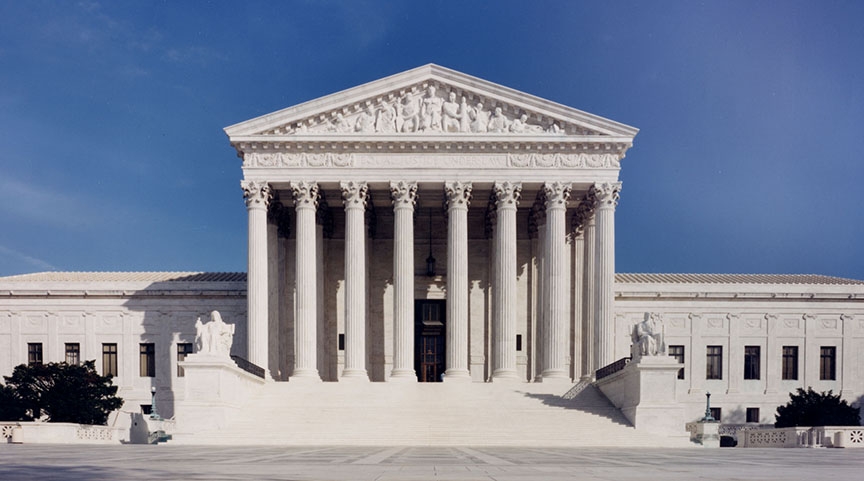
MBA, NAHB, NAR Warn Supreme Court Of Chaos If CFPB Ruled Unconstitutional

File amicus brief in support of regulator in case to be heard later this year.
Three major housing and mortgage industry organizations have asked the U.S. Supreme Court to use caution in ruling on the constitutionality of the way the Consumer Financial Protection Bureau is funded, saying a broad decision could harm “both consumers and the broader economy.”
In an amicus brief filed Monday, the Mortgage Bankers Association (MBA), the National Association of Home Builders (NAHB), and the National Association of Realtors (NAR) highlight “the potentially catastrophic consequences” should the court ruling undermine all of the CFPB’s regulations.
The nation’s highest court in February granted the CFPB’s petition seeking a review of a lower court’s ruling that the agency’s funding method is unconstitutional.
The CFPB’s appeal stems from a federal appeals court ruling issued Oct. 19, 2022. The decision by a three-judge panel of the 5th U.S. Circuit Court of Appeals in New Orleans was issued as part of a ruling on an appeal of a case brought by payday lending groups. The Community Financial Services Association of America and Consumer Service Alliance of Texas had sued the CFPB, challenging the validity of its 2017 payday lending rule, which regulates high-interest rate lenders.
The plaintiffs contended that in enforcing the rule, the CFPB “acted arbitrarily and capriciously and exceeded its statutory authority,” according to court documents. The groups also contended that the CFPB “is unconstitutionally structured, challenging the bureau director’s insulation from removal, Congress’s broad delegation of authority to the bureau, and the bureau’s unique, double-insulated funding mechanism.”
The U.S. District Court for the Western District of Texas rejected those arguments, but that decision was appealed to the 5th Circuit Court.
When the CFPB was created as part of the 2010 Dodd-Frank financial overhaul law, Congress chose to exempt the bureau from annual appropriations. Instead, CFPB is funded by transfers from the Federal Reserve. While the funding is capped at 12% of the Fed’s annual budget, it cannot reject requests that fall under the cap.
The 5th Circuit Court’s decision stated that, “Congress’ decision to abdicate its appropriations power under the Constitution, i.e., to cede its power of the purse to the bureau, violates the Constitution’s structural separation of powers. We thus reverse the judgment of the district court, render judgment in favor of the plaintiffs, and vacate the bureau’s 2017 Payday Lending Rule.”
'Be Careful'
In their amicus brief, the MBA, NAHB, and NAR state that nearly all residential real estate transactions depend on compliance with CFPB rules.
“If this court rules for respondents and strikes down the Payday Lending Rule, it must be careful to issue a circumscribed ruling that does not call into question other crucial regulations issued by the CFPB over the past years …” the brief states.
It continues, “In Seila Law LLC v. CFPB, this Court recognized that undoing the CFPB’s actions across the board “would trigger a major regulatory disruption” and do ‘appreciable damage to Congress’s work in the consumer-finance arena.’ That warning remains true today.”
The organizations said they filed their brief “to highlight the potentially catastrophic consequences that a decision drawing those rules into doubt could have on the mortgage and real-estate markets. Thus, this Court should take care not to call into question current CFPB regulations, including those governing the real-estate financing industry, which could lead to immediate and intense disruption to the housing market, harming both consumers and the broader economy.”
In the Seila Law case, the CFPB was investigating the law firm that provides debt-relief services and issued a civil investigative demand requiring the firm to respond to several interrogatories and requests for documents. Seila Law refused to comply, so the CFPB filed a petition in court to force compliance.
The district court granted the petition, but Seila Law appealed, including on the grounds that the CFPB is unconstitutionally structured. The firm argued that the agency’s leadership structure — it is led by a single director removable only for cause — violated the separation of powers.
The Ninth Circuit Court rejected that argument, but the Supreme Court reversed that ruling in June 2020. In a 5-4 decision, the court ruled that the CFPB’s structure violates the Constitution’s separation of powers. However, in a 7-2 decision, the court ruled that the issue of the director’s removal protection could be severed from the CFPB’s other authorities, while leaving the CFPB’s other powers in place.
'Descend Into Chaos'
The MBA, NAHB, and NAR state in their brief that if the court now decides to issue a ruling that goes beyond invalidating the Payday Lending Rule “and asserts that these mortgage-related rules are potentially invalid…, it could set off a wave of challenges and the housing market could descend into chaos, to the detriment of all mortgage borrowers.”
It continues, “Lenders, servicers, and consumers have operated by the CFPB’s guideposts for more than 10 years, and without those rules substantial uncertainty would arise as to how to undertake mortgage transactions in accordance with federal law.”
The three organizations add that if the court rule the CFPB’s funding method unconstitutional, it should do what it did in the Seila Law case and “sever any offending portions…. In addition, it may be appropriate for the Court to further Congress’s intent to promote financial stability by granting de facto validity to past actions that the CFPB took under its current funding scheme. And the Court should consider other steps to limit the adverse consequences of such a ruling.”
The Supreme Court is scheduled to hear the case during its next term, which begins in September, with a decision issued by the end of this year or in early 2024.




